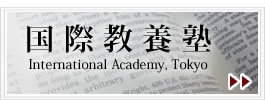読み物カテゴリ: ‘法学から見る「人間」「社会」’
Astronomically speaking, law is “local” and “simple” science.
Have you ever deeply considered that why there are a number of statute laws established in this country? Does this country keep justice and the social order “reasonably” without statute laws established all the time?
It goes without saying that law vividly performs such an important role to keep justice and order in the Japanese society. But, unfortunately, it is impossible to keep these without having statute laws in the society. We human beings are not angels at all. No human being is impeccable. Therefore, we human beings need laws to maintain justice and the social order. As to justice, there is no absolute justice. All of theories regarding justice are “justified theories” (man-made theories).
On the other hand, there is another interpretation regarding statute laws. We find the significance of having statute laws on the condition that we have our human society here on this earth. Reversely, this means that we don’t need any laws, if there is no human society organized at all.
Astronomically speaking, law is “local” and “simple” science. You cannot not find any meaning of existence of law without having our human society. Hence, it is absolutely natural to recognize the importance of existence of society first and the existence of law second.
英語音声講義
⇒ Astronomically speaking, law is “local” and “simple” science.(英語音声講義)
The characteristics of law in Japan in comparison with laws in Western civilization
英語音声講義
⇒ The characteristics of law in Japan in comparison with laws in Western civilization(英語音声講義)
Rudimentary academic voyage in psychology Ⅱ
英語音声講義
⇒ Rudimentary academic voyage in psychology Ⅱ(英語音声講義)
Rudimentary academic voyage in psychology Ⅰ
英語音声講義
⇒ Rudimentary academic voyage in psychology Ⅰ(英語音声講義)
「暴力の概念」(the concept of violence)について講じた全3巻の英語音声講義を掲載しました。
英語音声講義
⇒ the concept of violence Ⅰ(英語音声講義)
⇒ the concept of violence Ⅱ(英語音声講義)
⇒ the concept of violence Ⅲ(英語音声講義)
The essence of individualism should be jurisprudently reviewed.
Jurisprudently speaking, it is quite indispensible to reasonably review the meaning of society organized by human beings. Above all, those essential social questions “why we human beings need the society,” and “how we human beings see the significance of maintaining the society artifically organized.”
To review the essential meaning of the society, the matter, “the meaning of individualism should be deliberately reviewed. The individualism shall be naturally divided into two kinds in it. One is “rugged individualism,” the other is “original individualism.” Rugged individual is that you think about your benefit and happiness and don’t respect other people, and other people don’t respect you at all. Regarding original individualism, you delightedly respect other people by your affection, and other people respect you as well.
It is immensely expected to consider the reasonable way to realize the “ideal individualism” for the sake of legally protecting respective individuals who just dwell in this country. The constitution of Japan was established in 1946 and this country still uses the consitution right now. Is this constitution working reasonably in order to constitutionally protect the individualism for the Japanese citizens? Are the Japanese citizens using and interpreting the articles of the constitution in consideration of the utmost importance of protecting fundamental human rights individually?
Moreover, Which is more important, “individual (individualized) value” or “social (socialized) value?” How and where can you jurisprudently find the essence of humanity in the existent civilizations all over the world? As a matter of fact, there are actually so many legal questions we human beings should think of in any of countires here on the earth.
英語音声講義
⇒ The essence of individualism should be jurisprudently reviewed.(英語音声講義)
Characteristics of a Bicameral Legislature under the Constitution of Japan of 1946
Article of 41 of the Constitution of Japan established in 1946 provides that “the Diet shall be the highest organ of state power, and shall be the sole law-making organ of the State.” The Diet is the highest national organ, but it doesn’t mean that the Diet is legally granted to freely use (abuse) the state power at all.
It is a well-known fact in the world that Japan constitutionally possesses the “separation of three powers” as a sovereign state under the constitution of Japan established in 1946 after the Pacific War (1941-1945). These three separated powers are 1) “the Diet” as the legislative power, 2) “the Cabinet” as the administrative power (Article 65 of the same provides that “Executive power shall be vested in the Cabinet.”) and 3) “Judiciary” as the judicial power (Article 76 of the same provides that “the whole judicial power is vested in a Supreme Court and in such inferior courts as are established by law”).
Article 42 of the same provides that “the Diet shall consist of two Houses, namely the House of Representatives and the House of Councillors.” The Members of both houses are firmly elected by direct vote of the Japanese people. As to their terms of service, it is provided as four years for the member of the House of Representatives (Article 45 of the same), likewise, it is provided as six years for the members of the House of Councillors (Article 46) as well.
Regarding the “state organ” the Diet, it is indispensably very important to grasp the existence of the Diet as the following essential legal meanings, the Diet shall be “the highest organ of state power,” and “the sole law-making organ of the State.” This means that the Japanese people have the “sole way” to establish laws through the Diet members of the two Houses justly voted and equally elected by the Japanese people. This legally (constitutionally) keeps the “genuine democracy” for the sake of the people in this country. Obviously, this is a matter of “indispensability” at any cost.
The Diet members are expected to constitutionally grasp some of the important meanings of law such as the following basic legal questions, 1) the most important role law (statute law) jurisprudentially possesses in consideration of the history of mankind, 2) the significance of the concept, “rule of law” in comparison with “rule by law,” 3) the meaning and the quintessence of “citizen.”
Currently, are the Diet members humbly working for the sake of realizing an ideal democracy for the Japanese people? This is a crucial political question the people should not forget from generation to generation at all times without a doubt.
Is it just an “armchair dream” to optimistically expect having such ideal future Diet no citizen seriously questions regarding their service at all? All we know now is that there is no such an ideal law-making state organ in the world at all times. This is a “nature” of the man-made society nobody can ameliorate at all.



